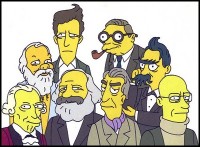PACTISS recommends

Where science meets art. The only necessary and sufficient book store in Melbourne.
Hope our friends enjoy the new look and feel – now optimised for mobile devices for access on the go.

PEOPLE
-
Coordinator: Peter Ellerton
Web guy: Jason Etheridge RESOURCE COLLECTIONS
NEW RESOURCES
-
- A nice Philosophy of Mind summary
- The power of categorical logic
- What exactly is the scientific method and why do so many people get it wrong?
- Paralympic athletes faster than olympic athletes — what does this tell us about difference?
- Logic: if + then = why? How can we understand the power of logic?
- How do we ensure we are exposed to new ideas? A parody with bite.
- A Life of Meaning (Reason Not Required) – What is the nature of our relationship with reason?
- Can you name this cognitive bias?
- By what measures can we value human life?
- Teaching philosophy improves standardised scores
- Are we in control of our own decisions?
- Neuroscience and education: myths and messages
- Free will is not as free as we think – and that’s ok.
- Where’s the Proof in Pseudoscience?
- Science in the lead?
RANDOM POSTS
-
- Why do humans reason? Arguments for an argumentative theory
- Putting a brake on tolerance
- Continental bid to remove veil in the face of Islamic extremism
- Australasian Association of Philosophy
- Danger in toxic discourse
- Do home-schooled kids get enough social education?
- Is Mathematics Discovered or Invented?
- What does it mean to think and could a machine ever do it?
- The power of the non sequitur
- Anecdotal Evidence cartoon
USEFUL RSS FEEDS
 Philosopher’s Zone
Philosopher’s Zone NYTimes – The Stone
NYTimes – The Stone Philosophy Now
Philosophy Now RSA Animate
RSA Animate- The Green Corridors Initiative
- Governance governing government
- Why print money when we can print wealth?
- Building a resilient health and care system
- We'll always have Paris?
- Experimentation and equity in global cities
- Technology-enabled deliberative democracy
- Healthier placemaking
- Creating a sovereign wealth fund in Wolverhampton
- Economic recovery and climate action
 Scientific American – Mind and Brain
Scientific American – Mind and Brain- Asexuality Research Has Reached New Heights. What Are We Learning?
- Political Ads Can Target Your Personality. Here's What Could Go Wrong
- Why Writing by Hand Is Better for Memory and Learning
- People with Myalgic Encephalomyelitis/Chronic Fatigue Syndrome May Have an "Exhausted" Immune System
- How to Close the 'Orgasm Gap' for Heterosexual Couples
- Virtual Bar Scenes Are a New Tool to Study Why People Commit Crimes in the Heat of the Moment
- Anger Can Help You Meet Your Goals
- How Sleep Engineering Could Help Heal the Brain
- Dominatrices Are Showing People How to Have Rough Sex Safely
- Farmers in Crisis, Long Overlooked, Are Finally Getting Mental Health Support
 TED talks
TED talks- War journalism should be rooted in empathy — not violence | Bel Trew
- The problem with food and climate — and how to fix it | Jonathan Foley
- How buildings can improve life — inside and out | Doris Sung
- The satellite helping slow climate change — right now | Millie Chu Baird
- What's possible when the arts belong to everybody | Lear deBessonet with Brian Stokes Mitchell
- “Cant de la Sibil·la” / "Quien Más Me Ama" | Maria Arnal
- Bravery, brilliance and RuPaul Charles | On the Spot | RuPaul Charles
- How to claim your leadership power | Michael Timms
- Why young people are worse off than their parents — and what to do about it | Scott Galloway
- Quantum computers aren't what you think — they're cooler | Hartmut Neven
THEMED RESOURCES
- July 2024MonTueWedThuFriSatSun123456789101112131415161718192021222324252627282930311234
Category Archives: Critical Thinking
The power of categorical logic
The sum of all knowledge in two books…
Posted in Critical Thinking, Media Articles, Cartoons
Tagged categorical logic
Comments Off on The power of categorical logic
What exactly is the scientific method and why do so many people get it wrong?
There’s a big difference between science and pseudoscience. But if people don’t understand how science works in the first place, it’s very easy for them to fall for the pseudoscience. Source: What exactly is the scientific method and why do … Continue reading
Posted in Critical Thinking, Media Articles, Cartoons, Philosophy of Science
Comments Off on What exactly is the scientific method and why do so many people get it wrong?
How do we ensure we are exposed to new ideas? A parody with bite.
Assuring users that the company’s entire team of engineers was working hard to make sure a glitch like this never happens again, Facebook executives confirmed during a press conference Tuesday that a horrible accident last night involving the website’s algorithm … Continue reading
Posted in Critical Thinking, Media Articles, Cartoons
Comments Off on How do we ensure we are exposed to new ideas? A parody with bite.
A Life of Meaning (Reason Not Required) – What is the nature of our relationship with reason?
If philosophy is to stay relevant, it must bridge the gap between feeling, thought and reason. Few would disagree with two age-old truisms: We should strive to shape our lives with reason, and a central prerequisite for the good life … Continue reading
Posted in Critical Thinking, Media Articles, Cartoons, Philosophy of Mind - Consciousness, Philosophy of Religion, Philosophy of Science
Comments Off on A Life of Meaning (Reason Not Required) – What is the nature of our relationship with reason?
Can you name this cognitive bias?
Posted in Critical Thinking, Media Articles, Cartoons
Comments Off on Can you name this cognitive bias?
By what measures can we value human life?
The Fallen of World War II from Neil Halloran on Vimeo. It can clearly be challenging to convey the magnitude of loss after a tragedy, particularly when that number is in the tens of millions, yet that is precisely what … Continue reading
Posted in Critical Thinking, Ethics and Moral Philosophy, Social and Political Philosophy
Comments Off on By what measures can we value human life?
Teaching philosophy improves standardised scores
Want to improve NAPLAN scores? Teach children philosophy Latest figures show that student scores in reading, writing, language and numeracy have failed to improve despite schools receiving record funding over the past few years. The National Assessment Program – Literacy … Continue reading
Posted in Critical Thinking, Media Articles, Cartoons
Comments Off on Teaching philosophy improves standardised scores
Are we in control of our own decisions?
Dan Ariely — One of the most significant of TED talks for understanding how we think.
Posted in Critical Thinking, Media Articles, Cartoons
Comments Off on Are we in control of our own decisions?
Neuroscience and education: myths and messages
NATURE REVIEWS | NEUROSCIENCE Abstract: For several decades, myths about the brain — neuromyths — have persisted in schools and colleges, often being used to justify ineffective approaches to teaching. Many of these myths are biased distortions of scientific fact. … Continue reading
Posted in Critical Thinking, Media Articles, Cartoons, Philosophy of Mind - Consciousness
Comments Off on Neuroscience and education: myths and messages
Where’s the Proof in Pseudoscience?
Peter Ellerton, The Conversation Contrast this with homeopathy, a field that has generated no discernible growth in knowledge or practice. While the use of modern scientific language may make it sound more impressive, there is no corresponding increase in knowledge … Continue reading
Posted in Critical Thinking, Media Articles, Cartoons, Philosophy of Science
Comments Off on Where’s the Proof in Pseudoscience?
Teaching the nature of science (and keeping students engaged)
Peter Ellerton, The Conversation What’s particularly disturbing about current science education at the primary, secondary and tertiary level is the almost complete lack of explicit consideration of what I’ve referred to as the “nature of science”. Not only are many … Continue reading
Posted in Critical Thinking, Media Articles, Cartoons, Philosophy of Science
Comments Off on Teaching the nature of science (and keeping students engaged)
Why You Don’t Know Your Own Mind
Alex Rosenburg, The Stone. It is often said that we can never truly know the minds of others, because we can’t “get inside their heads.” Our ability to know our own minds, though, is rarely called into question. It is … Continue reading
Posted in Critical Thinking, Media Articles, Cartoons, Philosophy of Mind - Consciousness, Philosophy of Science
Comments Off on Why You Don’t Know Your Own Mind
A Critical Thinking Matrix
Exploring the relationship between cognitive skills and the values of inquiry. Grey boxes describe student work. This can be used to generate rubrics. CT Matrix
Posted in Critical Thinking, Syllabus and Course Outlines
Comments Off on A Critical Thinking Matrix
The Skills, Values and Virtues of Inquiry
A model for understanding effective thinking through categorising key educational ideas and examining the relationships between them. Skills Values and Virtues of Inquiry
Posted in Critical Thinking, Syllabus and Course Outlines
Comments Off on The Skills, Values and Virtues of Inquiry
Why would anyone believe the Earth is flat?
Peter Ellerton, The University of Queensland Belief in a flat Earth seems a bit like the attempt to eradicate polio – just when you think it’s gone, a pocket of resistance appears. … Continue reading
Posted in Critical Thinking, Media Articles, Cartoons, Philosophy of Science
Comments Off on Why would anyone believe the Earth is flat?
We can’t trust common sense but we can trust science
Peter Ellerton, The University of Queensland When a group of Australians was asked why they believed climate change was not happening, about one in three (36.5%) said it was “common sense”, according to a report published last year by the … Continue reading
Posted in Critical Thinking, Media Articles, Cartoons, Philosophy of Science
Comments Off on We can’t trust common sense but we can trust science
Teaching how to think is just as important as teaching anything else
Peter Ellerton, The University of Queensland A new paper on teaching critical thinking skills in science has pointed out, yet again, the value of giving students experiences that go beyond simple recall or learned procedures. It is a common lamentation … Continue reading
Posted in Critical Thinking, Media Articles, Cartoons
Comments Off on Teaching how to think is just as important as teaching anything else
Some useful tips on how to raise an argumentative child
Peter Ellerton, The University of Queensland The old adage that children should be seen and not heard is nothing but wishful thinking. Children are naturally inquisitive and they usually can’t help verbalising their curiosity. Asking “why?” is the most natural … Continue reading
Posted in Critical Thinking, Media Articles, Cartoons
Comments Off on Some useful tips on how to raise an argumentative child
A causal nightmare
More from Dilbert
Posted in Critical Thinking, Media Articles, Cartoons
Tagged fallacies of reasoning
Comments Off on A causal nightmare
If it’s not right to rape a rapist, how can it be OK to kill a killer?
Discuss (1) this analogy and the (2) image below. (1) Here is the source article for the analogy. “That’s the thing. The reason why we would be hesitant to endorse it is that – what normal person would be paid to do something so … Continue reading
Posted in Critical Thinking, Media Articles, Cartoons, Social and Political Philosophy
Comments Off on If it’s not right to rape a rapist, how can it be OK to kill a killer?
